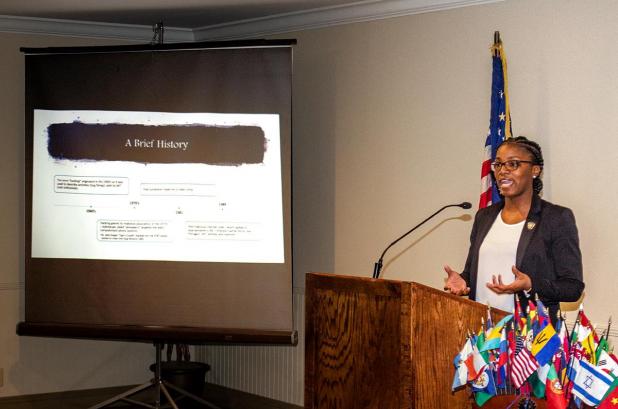
Cybercrime
Detective Whytley Jones, St. Mary Parish Sheriff’s Office, spoke Tuesday to Franklin Rotarians about cybercrime and how to prevent victimization by cyber criminals.
Jones said cybercrime has been reported within St. Mary Parish, but that it is also pervasive and a wide spread phenomenon; not exclusive, but of world-wide interest.
According to Jones, the commission of cybercrimes necessitates only a computer and access to a network, yet it takes many forms.
In a brief history, she said that the word “hacking,” was coined in the 1960’s, and before it was used for the commission of crimes, hacking started out as a way for MIT technicians to assist in repairing malfunctioning train networks.
“In the 1970’s, hacking gained its malicious association,” she said, citing the story of an early hacker named Captain Crunch, (John Draper) who pried his way into the AT&T servers so that he could make long distance calls for free.
According to Jones, Draper couldn’t be prosecuted because it was unclear to law enforcement how to proceed legally to such an effect.
She said that since then, various types of cybercrimes have grown in number and kind, but the most common types of cyber thefts that SMPSO sees, include: phishing, skimmers and key logging.
She also added cyber harassment, stalking, cyberbullying and cyber pedophilia as points of daily concern at the sheriff’s office.
“Phishing, one of the most popular cyber theft crimes is when they (hackers) target us through phone calls and/or emails,” Jones said.
She explained that many times the email or phone call appears to come from a trusted or familiar source, and that the hackers “spoof” phone numbers and email addresses to this effect in order to lower the guard of the targeted recipient.
Once the clear channel of access is produced by the opening of the email, or accepting the call, the scammers have their leave of the system and its contents—phishing.
Jones also pointed to “skimmers,” as a scam to guard against.
“This has been a big issue in the Houma area,” Jones said. “People are adding skimmers to the card readers on gas machines.
“When you put your card in there, it automatically takes all your information and submits it to another server, and your information is then sold via the dark web.”
Jones said a technique she personally uses to thwart skimmers is to jiggle the card inside of the card reader. She said that if the reader comes apart, pops out, or appears to be a different color than the rest of the apparatus, that may be a skimmer.
She continued, “To prevent cyber theft, the easiest way is to use common sense. With a phone call, disconnect the call and don’t give out any information.
“Disregard the emails and report the emails as ‘spam.’ Refrain from giving out your personal or sensitive information over the phone, or through email.”
As pertains to cyber bullying, Jones’ advice was the same as it was in reference to cyber theft: Block, delete, and/or report.
She said that cyber bullying tends to occur with younger internet and social media users, and that it is important to inform young users of the dangers inherent in the world-wide web.
Aside from changing passwords often, Jones offered as a proactive step in prevention, available government agencies to which one may report criminal activity: the Internet Crime Complaint Center at https://www.ic3.gov/complaint/splash.aspx, or local law enforcement, (i.e. SMPSO).
